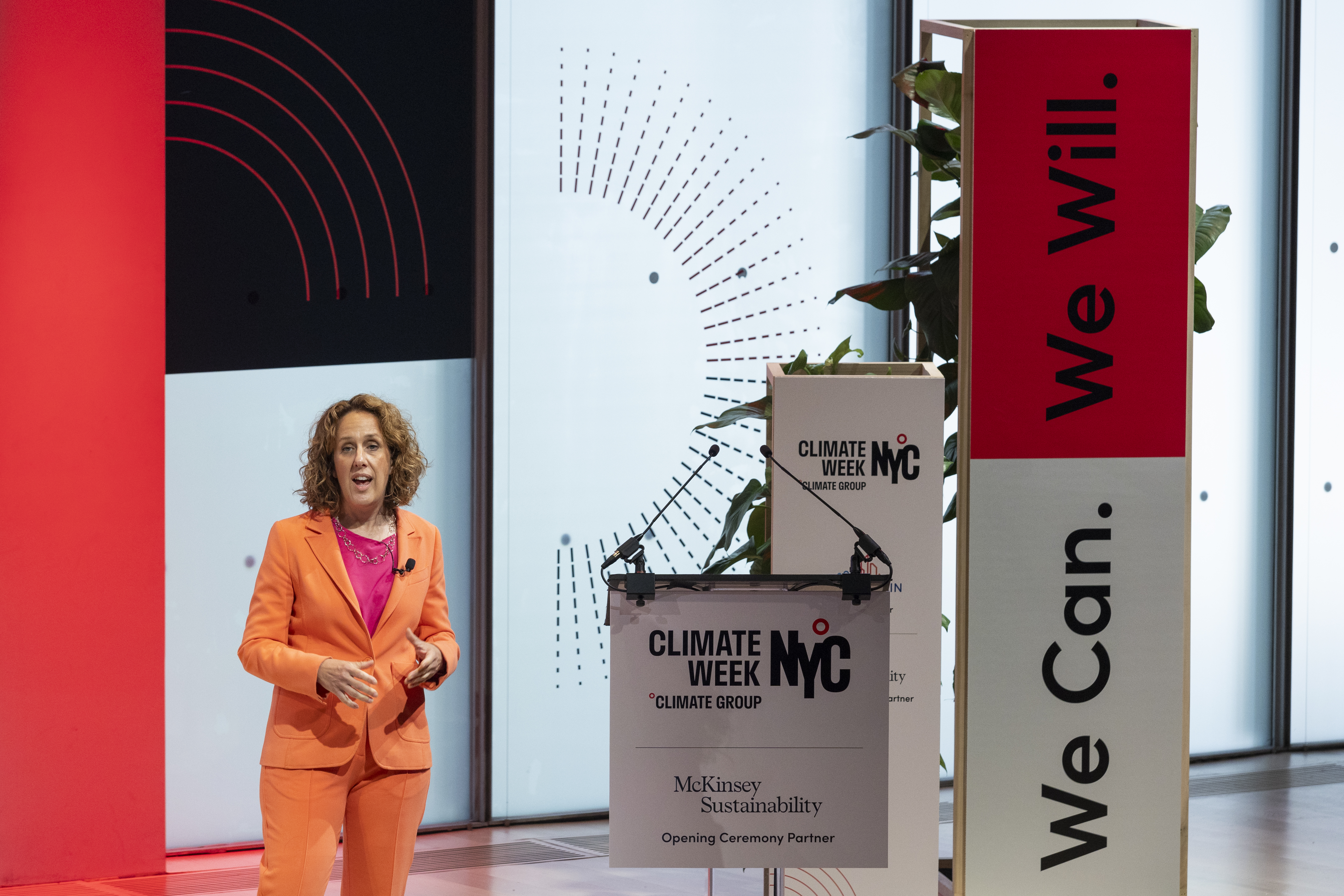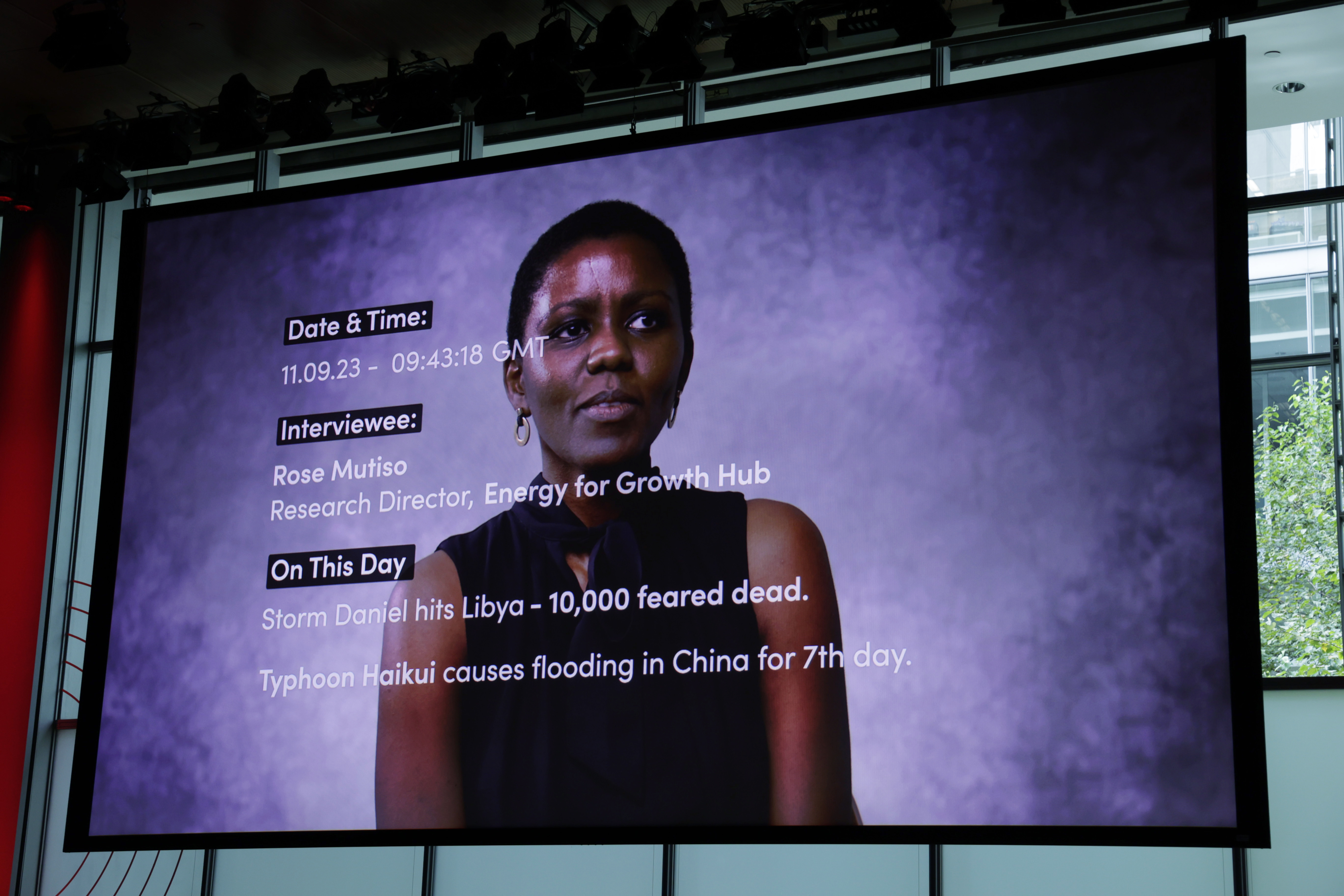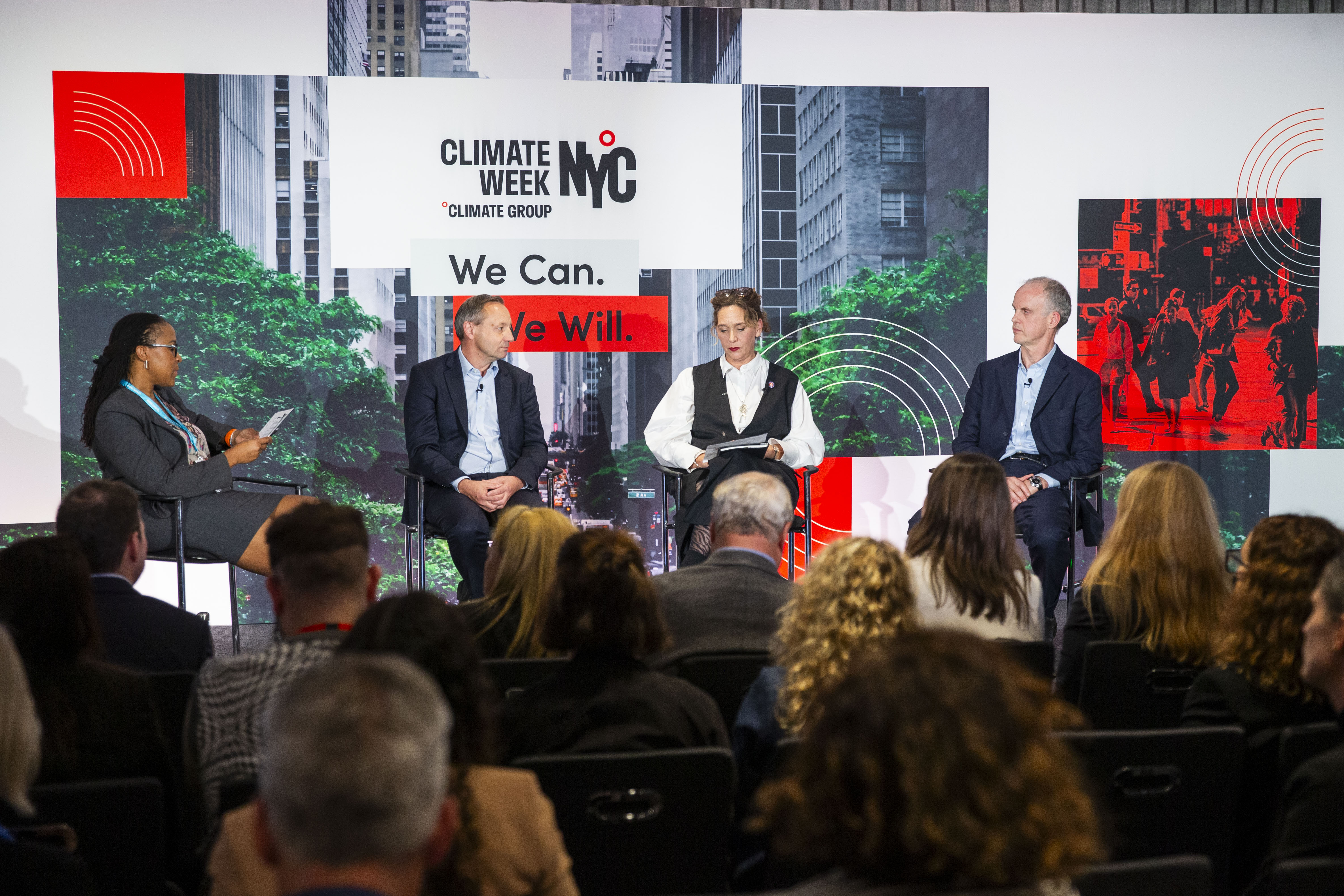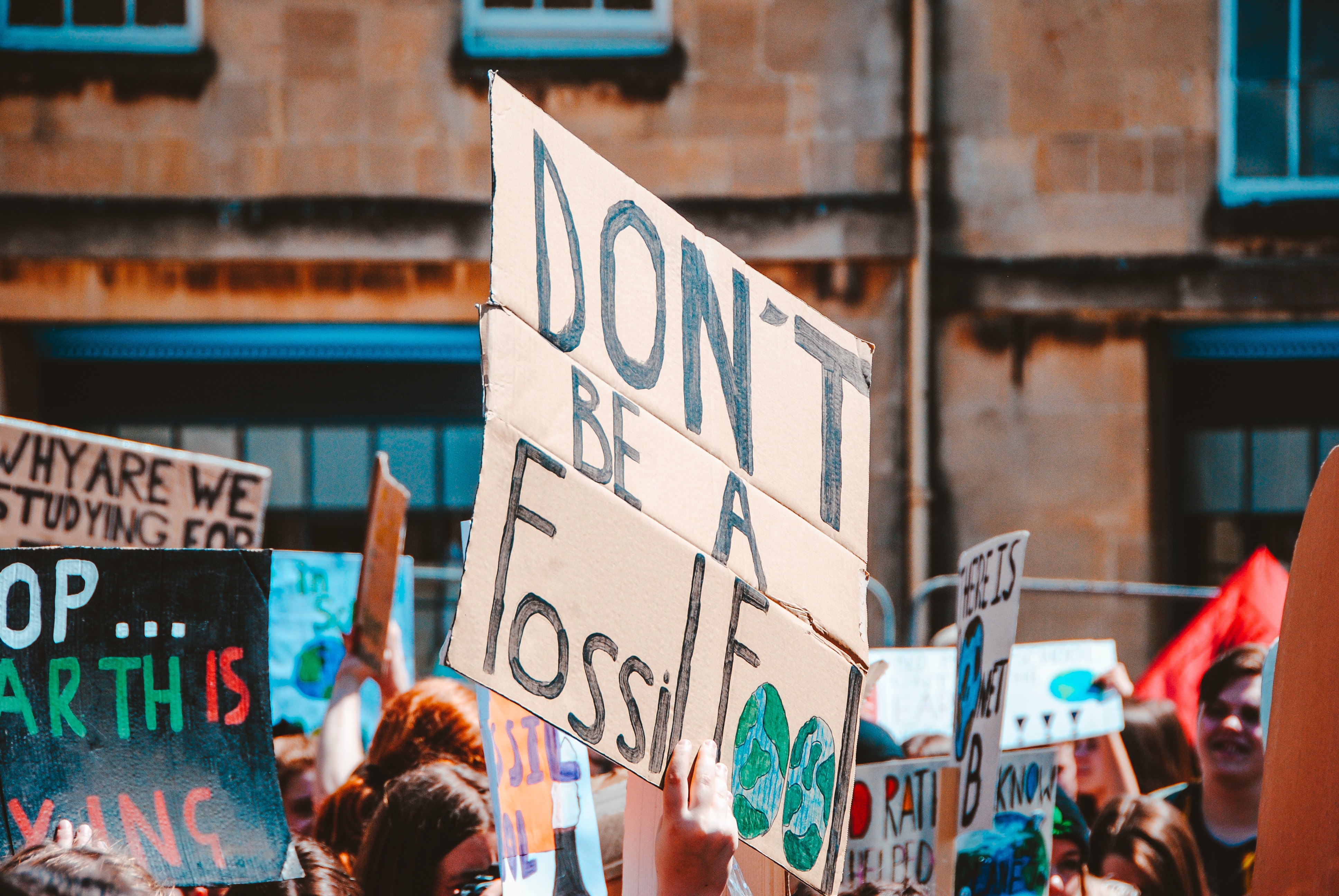Back for its 15th year with the battle cry “We Can. We Will.” Climate Week NYC 2023 has just wrapped up its agenda for another year. With a main program featuring dozens of talks (many still available to watch online) as part of over 400 events, it’s the largest climate event of its kind worldwide, providing a much-needed platform for connection and discussion. There was a lot to take in, so here’s a handy recap of some key takeaways.
 Helen Clarkson delivering the opening speech
Helen Clarkson delivering the opening speech
Shining Example
The summit’s opening speech highlighted the boom in solar energy and the ever-growing momentum of the green economy despite naysayers. Climate Group’s CEO, Helen Clarkson recounted the transition from:
“just a couple of decades ago, solar was one of the most expensive energy sources in the world. People said that renewables would never be able to compete…[then] China started ramping up its production of solar panels, subsidies across Europe accelerated the boom - and look where we are now...The International Energy Agency calls solar the “cheapest electricity in history.”
)](https://cdn.rejobs.org/article/8/climate-week-nyc-2023-lcoe-solar-pv-offshore-and-onshore-wind.png) Levelized cost of energy production (LCOE) for solar PV, offshore and onshore wind (Source: Our World in Data, 2023)
Levelized cost of energy production (LCOE) for solar PV, offshore and onshore wind (Source: Our World in Data, 2023)
Free the Market
The opening speech also criticised “governments that have said they support climate action…[but are] slow to adapt policies and regulations.” In outlining how corporate companies have helped spearhead change, she emphasised the urgency for updated government measures: “when business giants speak, governments at all levels had better listen…The market is taking action…it’s up to governments to act.”
This was reiterated in the short film, Facing the New Reality, shown at the Opening Ceremony in which Harvard Professor Naomi Oreskes called out the subsidies still received by fossil fuel companies and how these must be revoked for renewables to compete on a level playing field in a free market.
 Rose M. Mutiso, Research Director, Energy for Growth Hub
Rose M. Mutiso, Research Director, Energy for Growth Hub
Energising, Innovating and Accelerating
Naturally, renewables featured heavily on the Climate Week agenda and energy itself was one of ten key themes discussed across the week. “Responsible for two-thirds of greenhouse gas emissions, energy is the largest polluting sector globally,” Climate Group states.
Clarkson’s address identified the potential for AI to manage energy demands as a key area of development alongside the need for storage innovations and international interconnectors to relay energy from grid to grid.
 Fleets of electric cars could store and relay energy
Fleets of electric cars could store and relay energy
One of three flagship sessions in the main program was titled “The most urgent challenge - phasing out fossil fuels,” which outlined the combination of infrastructure investment, regulation and interventions needed to phase out fossil fuels. Sessions on decarbonisation and working towards net-zero featured across various industrial sectors from building and agriculture to fashion and transport. Just transition and scalability were other key themes across the week.
 Phasing out fossil fuels was deemed the most urgent challenge
Phasing out fossil fuels was deemed the most urgent challenge
Business Recognised for Progress on Renewables
Since its launch at Climate Week NYC 2014, over 400 of the world’s largest businesses have become members of the RE100 corporate initiative to show their commitment in going 100% renewable before 2040. This year’s RE100 Leadership Awards recognised the ambition and innovation of tech giant Google, alongside the world’s largest flavour and fragrance creators, Givaudan, cosmetics company Amore Pacific, health insurers Elevance Health and ePaper market leaders E Ink. The event’s Hub Live sponsor and world’s largest brewer ABinBev was also recognised in the awards.
Global Movements Collide
Coinciding with the opening day of Climate Week, 75,000 people took to the city’s streets to demand stronger action on climate change as part of worldwide marches by The Global Fight to End Fossil Fuels movement. Yet a few days later, the world’s greatest polluters such as China, India, the US, France and the UAE, who will host COP28 in December, were notably absent from the UN Climate Ambition Summit. As was the UK, whose prime minister Rishi Sunak simultaneously announced he was scrapping and delaying a range of policies set to meet net-zero targets and in the event’s immediate aftermath approved the biggest undeveloped oil field in the North Sea.
 New York City was at the centre of climate protests and politics
New York City was at the centre of climate protests and politics
Finding our Collective Drive
The key message from Clarkson’s opening speech was her assertion that we have the know-how, what we now need is “relentless determination”. In line with her concluding emphasis that “it’s all of us”, it has emerged that a Local Climate Action Summit will be held in conjunction with COP28 Dubai later this year.
As the first formal summit to bring subnational leaders such as mayors, governors, businesses and NGOs into the COP program, this news brings hope for the type of multi-level collaboration seen around COP21 in 2015 when the historic Paris Agreement was adopted.
 “It’s all of us” from local communities to global initiatives
“It’s all of us” from local communities to global initiatives
Following a summer of heatwaves and record sea temperatures along with climate-driven disasters from wildfires to flooding, all eyes will now be looking ahead to COP28. The first ever Global Stocktake there will evaluate global progress towards the main aim of the Paris Agreement; limiting the temperature increase to 1.5 degrees celsius above pre-industrial levels.
Transitioning from fossil fuels to renewable energy will be key to this success. There’s no more exciting or purposeful time to switch your career and play your part in history, whatever your background or skill set.
Article by Lauren Holford
Published on September 29, 2023
Share this blog post with your folks, and help them find a career to be proud of.



